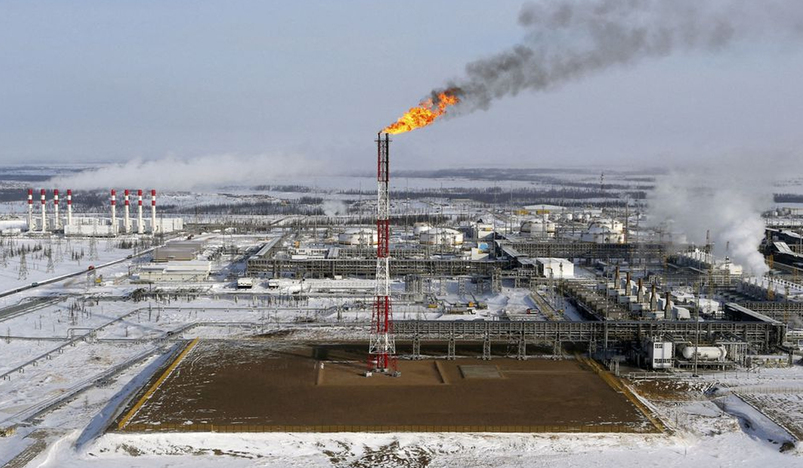
A flame burns from a tower at Vankorskoye oil field owned by Rosneft company north of the Russian Siberian city of Krasnoyarsk March 25, 2015.
Oil prices rose on Thursday, extending a cautious rally this week on signs of tight supply while the European Union (EU) wrangles with Hungary over plans to ban imports from Russia, the world's second-largest crude exporter, after it invaded Ukraine.
Brent crude futures for July settlement gained 40 cents, or 0.35%, to $114.43 a barrel at 0412 GMT.
U.S. West Texas Intermediate (WTI) crude futures for July delivery climbed 55 cents, or 0.5%, to $110.88 a barrel.
A bigger-than-expected drawdown in U.S. crude inventories in the week to May 20, following soaring exports, buoyed the market on Wednesday. Analysts said the inventory draw and the prospect of an EU embargo on Russian oil, in retaliation for what Moscow calls its "special military operation" in Ukraine, were pushing prices higher.
"The focus in oil markets is on the EU summit taking place next week, at which another attempt will be made to agree on an EU-wide embargo on Russian oil," said Stephen Innes, managing partner at SPI Asset Management in a note.
European Council President Charles Michel on Wednesday said he is confident that an agreement can be reached before the council's next meeting on May 30.
However, Hungary remains a stumbling block to the unanimous support needed for EU sanctions. Hungary is pressing for about 750 million euros ($800 million) to upgrade its refineries and expand a pipeline from Croatia to enable it to switch away from Russian oil.
Even without a formal ban, much less Russian oil is available to the market as buyers and trading houses avoid dealing with crude and fuel suppliers from the country.
ANZ analysts pointed to cargoes from Baltic ports taking longer journeys to Asian refineries, while deliveries to the Netherlands and France have all but halted.
A forecast increase in oil output to a record high of 5.2 million barrels per day (bpd) in the Permian Basin of the United States is unlikely to plug the 2 million to 3 million bpd gap from lost Russian supply, said Commonwealth Bank commodities analyst Vivek Dhar.
Still, this week's rise in oil markets has been tempered by strict COVID-19 lockdowns increasing concerns about falling fuel demand in China, the world's biggest oil importer, and worries about inflation leading to slower global growth.
($1 = 0.9348 euros)
Source: Reuters / Reporting by Sonali Paul in Melbourne and Mohi Narayan in New Delhi; Editing by Christian Schmollinger
.jpg)
Qatar Secures Place Among the World's Top 10 Wealthiest Nations
.jpg)
Hamad International Airport Witnesses Record Increase in Passenger Traffic

Saudi Arabia: Any visa holder can now perform Umrah

What are Qatar's Labour Laws on Annual Leave?
Leave a comment